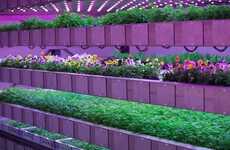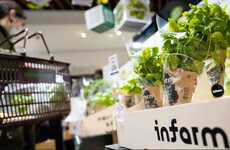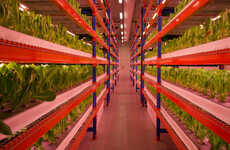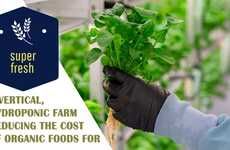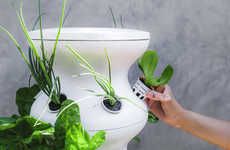
Mega Veggies Could End World Hunger
Dee Sandin — May 14, 2008 — Lifestyle
I wonder if these things have Air Miles? Mega Veggies are grown from seeds that were fired into space, where for two weeks, they orbited the Earth. Once returned, the seeds are cultivated in hothouses and the final product is the HUGE specimens seen in these photos.
Mega Veggies are a product of the Chinese who believe they could be a possible solution to the global food crisis. The Guandong Academy of Agricultural Sciences has grown 21 lb tomatoes, chilli peppers nine-inch long, 210 lb pumpkins and enormous watermelons. These Mega Veggies can feed many more people than their smaller cousins can and contain more nutrients. It is believed that near zero gravity conditions - microgravity - creates high-yield rice, wheat plants, tomatoes and peppers with harvests estimated to be 10 to 20 per cent greater than normal.
“Space seeds offer the opportunity to grow fruit and vegetables bigger and faster.†Researcher Lo Zhigang said: “Conventional agricultural development has taken us as far as we can go and demand for food from a growing population is endless. Theories, as to why time in orbit causes seeds to mutate, vary from cosmic radiation to microgravity. “We don't think there's any threat to human health because the genes themselves do not mutate, just their sequence changes,†he said. “With genetically-modified crops you have seen environmental problems because they have added genes that can damage other organisms. “But with space seeds they don't gain genes, they can only lose them.â€
Claims that Vitamin C content in some vegetables is nearly three times higher while levels of zinc are also boosted. What will they think of next?
I love the comment from Dave, Workhop - “Can't wait until they start sending certain body parts into space?†Boys will be boys.
Mega Veggies are a product of the Chinese who believe they could be a possible solution to the global food crisis. The Guandong Academy of Agricultural Sciences has grown 21 lb tomatoes, chilli peppers nine-inch long, 210 lb pumpkins and enormous watermelons. These Mega Veggies can feed many more people than their smaller cousins can and contain more nutrients. It is believed that near zero gravity conditions - microgravity - creates high-yield rice, wheat plants, tomatoes and peppers with harvests estimated to be 10 to 20 per cent greater than normal.
“Space seeds offer the opportunity to grow fruit and vegetables bigger and faster.†Researcher Lo Zhigang said: “Conventional agricultural development has taken us as far as we can go and demand for food from a growing population is endless. Theories, as to why time in orbit causes seeds to mutate, vary from cosmic radiation to microgravity. “We don't think there's any threat to human health because the genes themselves do not mutate, just their sequence changes,†he said. “With genetically-modified crops you have seen environmental problems because they have added genes that can damage other organisms. “But with space seeds they don't gain genes, they can only lose them.â€
Claims that Vitamin C content in some vegetables is nearly three times higher while levels of zinc are also boosted. What will they think of next?
I love the comment from Dave, Workhop - “Can't wait until they start sending certain body parts into space?†Boys will be boys.
Trend Themes
1. Mega Veggies - Disruptive innovation opportunity: Expanding agricultural practices to grow larger and more nutritious fruits and vegetables through space seed cultivation.
2. High-yield Agriculture - Disruptive innovation opportunity: Utilizing microgravity conditions to develop high-yield crops like rice, wheat, tomatoes, and peppers, resulting in increased harvests.
3. Nutrient Enhancement - Disruptive innovation opportunity: Exploring space seed cultivation to enhance nutrient content in vegetables, such as increased levels of Vitamin C and zinc.
Industry Implications
1. Agriculture - Disruptive innovation opportunity: Integrating space seed cultivation to revolutionize the agricultural industry by achieving larger crops and increased food production.
2. Nutrition - Disruptive innovation opportunity: Advancing the field of nutrition by utilizing space seed cultivation to enhance nutrient content and address global food crisis.
3. Space Technology - Disruptive innovation opportunity: Leveraging space seed cultivation to drive advancements in space technology and exploration for sustainable food production.
3.6
Score
Popularity
Activity
Freshness



